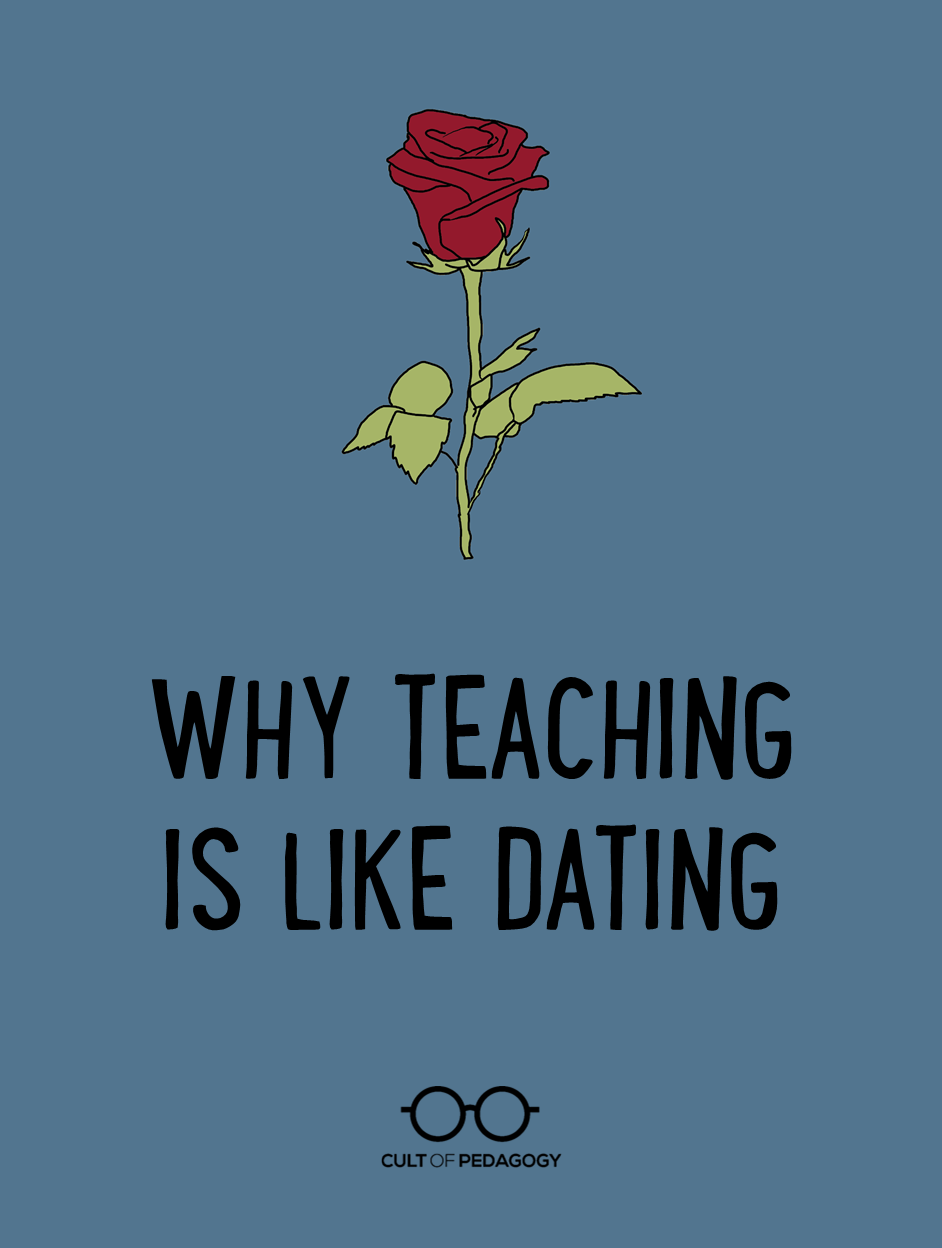
It’s always a little awkward when you compare teaching and dating. People start to fidget and offer an uncomfortable courtesy laugh. But teachers, bear with me, and try not to spill your Folgers.
I noticed this parallel last year, when one of my favorite students in the world came to me when my room was empty. It was one of those rare, silent times in a day.
“Boll, I need to ask you a question.”
“What’s up, man? Shoot.”
He stuttered in a way that that was slightly more uncomfortable than usual for him, so I knew he wasn’t asking me about an essay or an assignment.
“Well, it’s more that I need advice.”
I prodded a bit more as he fumbled through his words before he finally got out his request.
“I need some advice on how to get girls to like me. Can you help with that?”
Obviously, this student needed more help than I thought. Not only did he not know how to talk to a girl he liked, but he also thought this awkward 34-year-old white guy who tries to teach English in his neighborhood high school was a good place to start. I was never very smooth with the ladies, but I was honored by his bad judgement.
I told the kid that I thought he was super cool. But he was more the kind of cool that was going to crush his 30s. The kind of cool that would win grad school. Sweater vests, ties with jeans, and conversations about climate change are the kind of thing that coffee dates and wine parties are made of, but they might leave him hanging in high school. He was a hopeless romantic in a Snapchat world.
And I had some 34-year-old advice. I told him that every person I ever met likes to talk about themselves. So if you are talking to a girl you like, try to ask a lot of questions and let her talk a lot. If you are interested, let her know and ask more questions. I couldn’t promise he would magically be the most popular kid in school, but I could promise people would like being around him.
Generally—and this is not only true about romance—people are drawn to people who are more interested in others than themselves.
In this vein, I think teachers need to be better daters. Our students should like to be around us most of the time. The advice I gave the sweater vest kid is really the same advice I would give to any new teacher trying to find their way in this job: We should ask a lot of questions and listen a lot. We should want our students to like us, but not because we awkwardly talk about rap music and basketball. Our students should like us because we seem genuinely interested in their lives, their interests, and their frustrations.
Teachers, like any other segment of society, can be inclined toward bad judgments and associations. We tend to assume that the “cool teacher” means that teacher’s class must be really easy. It comes with a certain dress code, style, and dialect that students find relevant. People say things like “I don’t need my students to like me” in the teachers’ lounge and that seems to earn them a badge of honor. It’s like we’ve been trained to respect the hard ass, and judge the teacher that students actually enjoy. It makes no sense.
But I’ve seen the “cool teacher” come in all ages, shape, colors, and sizes. Their styles look more grandpa than GQ, their cultural references are usually 10 years too late, and they might be the farthest thing from smooth. Of course, I’ve also seen cool teachers that are really cool. That seem to fit the stereotype a little more closely, but have classes that students say is the hardest in the school.
Regardless of their style, students consistently say the same things about teachers they like: They care about what I’m saying, they ask questions, they seem to enjoy their job, and they don’t judge me based on what they see or hear. It doesn’t matter if they listen to the same music, or watch sports, or look like a model. It just matters that they listen to their students and ask questions about their lives.
I realize this might sound sappy, but my advice for teachers is to try to get students to like you. Not because you want to be the cool teacher, but because you want your students to learn. They are way more likely to really learn from someone that they like. And from someone that they think likes them.
Teachers, put on your outfits that were only stylish 15 years ago. Your loose-fitting JC Penney khakis, that new dress shirt you got at Kohl’s, and those athletic socks with brown leather shoes. Share your love of those awful moisture-wicking polo shirts with your school name emblazoned on the chest. Slide your feet into your favorite clogs that you always claim have great orthotic support. Then, walk into the classroom with a confidence in knowing that your success isn’t based on your hipster haircut or your perfectly-fitted skinny jeans. Look your students in their eyes and ask them how they are doing.
Then, listen. You’ll be amazed at what happens. ♦
Join our mailing list and get weekly tips, tools, and inspiration—in quick, bite-sized packages—all geared toward making your teaching more effective and fun. You’ll get access to our members-only library of free downloads, including 20 Ways to Cut Your Grading Time in Half the e-booklet that has helped thousands of teachers save time on grading. Come on in!!





Motivating, fascinating, true…thanks for writing and sharing it☺☺☺
Thanks so much for reading! I kind of have to write stuff like this to remind myself.
Love this! So very true – the “I don’t need my students to like me” badge of honour needs to be retired!
Amen! Definitely a badge worth retiring!
You hooked me with the line about rap music and basketball (I have done both this past semester). I agree with you; it seems that teachers have a disconnect when discoursing with students. A lot of times it seems that they just want someone to listen to them or be interested in their lives but it seems most teachers shut them out. I was subbing the other day for a class and had what everyone considers the worst kid in school in my room for the first time. I just started asking him questions about his life etc and answering his questions as honestly as I could. I called him on his actions a couple of times and he settled in and didn’t cause me any problems after that. I’ve had kids tell me, “all the teachers say we are the bad ones,” etc. and they come in expecting me to be on that page. It takes them time to realize that I make my own opinions and actually care what they have going on in their lives. I hope this doesn’t wear off as I progress through my teaching career, but I was telling my wife last night that I really think a lot of the apathy issue in my school is due to teachers not treating the students as individuals and respecting what they have to say. It is almost like the kids don’t care what the teachers have to say because the teachers don’t care what the kids have to say… I’m trying to break the cycle.
Right! There are many complicated things about teaching. But I also think we tend to over-complicate the simple things. You are right. Ask a few questions, show some interest, learn something that you will remember the next time you talk. That stuff matters. Keep that. And keep talking about it.
This is an amazing insight. It makes me sick to my stomach to hear people talking about the “bad kids” or “those kids” at our school. They are all just kids. Some have different issues, but we need to treat our students like we want our own children’s teachers treating our own kids.
I really agree with everything you say. The problem is, we teachers, especially elementary teachers who have to teach 9 different subjects are so fixated on time! How do we teach everything we need to in a 7 hour day and still have time to actually TALK to kids??
Ahhh! Time!!!! True. There is really none of it. The truth is, I let people down sometimes. I have 100-something students, and I can’t be everything to everybody. Teacher, listener, data-extraordinaire, professional… etc. Keep up the good fight. And let me know if you figure it out.
Sigh. The reality of the classroom. Gets me every time.
My problem is that as a 50 year old newish teacher I have my own children who have taught me everything about the culture of the youth. My oldest son is in middle school now and I have heard the music and seen the fads (fidget spinners, rubiks cubes, sneakers,anime etc) My youngest is still in elementary school and I learn about bullies, fidget spinners, mobile gaming and basketball jones).
When I go to school I find myself laughing at some of the stuff the kids do and say. And since I usually start the school year in October, it takes a while for the kids to warm up to me. Despite my graying unstyled hair, birkenstocks, and bland cover all attire, my kids (students) have grown to love me and me them! Other teachers are angrily yelling at them and whispering what a horrible child some of them are. Yes, they are horrible when they are cutting those classes to try to sit in mine!
My kids are the underdog and I look at their potential rather than their deficits (I was an underdog too).
Unfortunately, other teachers have told me that my openness to the kids who sit in the back of the class and have bad grades would bite me in the end.
Another thing I read is that the best place to put funds and efforts to raise test scores is in the children at the higher end of the grades.
It makes me want to cry! I feel the underdog can be motivated to succeed and it takes pulling them into the fray! And, as you said, asking the questions (some of the hard) and listening and then encouraging or finding out where the deficits are. Helping move toward wholeness.
I think your story is awesome. Mine is reverse; I had my kids after over ten years of teaching adolescents and now that my kids are teenagers, I’m winning at parenting them.
Anyway, teaching is such a complicated job and many of us complicated it more when we over simplify the issues and confuse the big stuff with the small stuff. I am sometimes that teacher you ate talking about and sometimes i am you. I too got called on the carpet, by the principal, for “favoring the bad kids” because I honestly liked “Giovanna with the gold tooth” and were got along great.leaving I was asked to resign, another student, a quiet girl who was planning to attend pharmacy school, wrote me a letter telling me how sad she was that i was leaving.
The idea of earmarking funds for the top kids is not only despicable, it’s an ineffective way to raise test scores. With most of those kids, you could hand them the book and tell them the date of the final. It take real teaching skills to teach the kids who don’t want to be taught and to balance the diverse needs of the classroom.
I’ve had varying success with students and the ones I’m most successful with are the ones with which i have been able to make a meaningful connection. For me, those are usefully boys, as I few up with a lot of brothers and I’m comfortable with them. Middle school boys crack me up and sometimes I tend to egg them on. I struggle with princesses, so I guess I should work on that, starting with not labeling them and getting to know them.
So it’s a complicated job.
As a new teacher that “keeps it cool”, I can honestly say this is what all teachers need to hear, not just old or new. Yes, we have to hone in on those standards, academic rigor, etc., but we also need to treat our students like actual humans and show that we care. Maybe it’s because I work at elementary grade level that this is more natural or prone to occur, but making those personal connections with your students creates such a classroom bond and trust between you and the students. Totally worth the time and effort!
I tend to agree with all the earlier comments, I only want to add that there are no bad children from God, rather what we have is bad teachers, bad adults, bad mentors, or even bad parents who do not give the right kind of education, mentorship and good parental care and up bringing. As teachers we have more work to do as agent of change to make these children better citizens.
Most of the bad adults in the lived of these kids are caving to the pressures of the systems around them. From the parents in poverty who are trying to provide a stable life, to those who have given up, the upper class people who feel they have to keep up appearances and that includes not admitting that your child needs an iep or is bi polar, or the single mom going from bed to bed trying to find a partner so their kids can be raised in a home with two adults. And don’t get me started on the diverse, and often dysfunctional expectations in the teaching profession that worships the badass teachers and still believe in the bell curve and that we can do a better job on diminishing funds. Moody adults think they are doing the best they can while falling far short of the mark. What it takes is to take a hard look at ourselves from time to time and to remember the big picture: raising kids into functional adults. Were need to forgive ourselves when were fail at that and then adjust.
Thanks for that piece Jason. I find that some students are already hooked into the system and they will do well, and enjoy classes regardless because for them the system affirms them and their identity and their aspirations. They see the system (in this case you, as their teacher) as relevant, caring and interested in them. But there are others for whom it makes no, or little sense, and for whom it is a chore, or even an obstacle to meaning, happiness and success. They need to know that you (as the current manifestation of the system) are relevant, caring and interested in them. When a teacher takes the time to ask the question (and listen for the answer), they open a whole new world for their student. I believe that all teachers need to watch one of the videos on ACR (Active Constructive Responding: for example https://www.youtube.com/watch?v=ZzVw-tB7xGQ&t=200s) and then set about being that teacher for their students.
Yeah, and just like dating, those kids can sniff a poser a mile away. Try to manipulate or con your way into their good graces and they will eat you alive lol. So, make sure your interest in them is sincere.
This is pure gold and, as a bonus, beautifully written. Thanks for sharing your thoughts on this. I wish more teachers knew this. Two things: 1) Asking more questions and 2) Listening more are positively gamechangers.
Great advice, and thanks for making me laugh!
I think every teacher should read Dale Carnagie’s How to Win Friends and Influence People. It teaches a lot of similar principles to the one in this article, such as letting people talk about themselves, calling people by their names, paying compliments, and smiling.
I think it would be wonderful for students to feel cared for and appreciated, but how do I balance this friendliness with necessary classroom management? I’ve also received the advice, “You are not students’ friend, you are their adult educator.” Do you agree with that advice? Or do you think it’s too harsh?
Hi Braden,
I can’t speak for others, but I think the student-teacher relationship is special enough as it is. While all healthy relationships are based on mutual respect, care, and appreciation, I don’t think it’s necessary to try to make our students our friends OR keep them at arm’s length. We are most effective when we provide a structured but nurturing learning environment where students feel safe, cared for, and appropriately challenged.